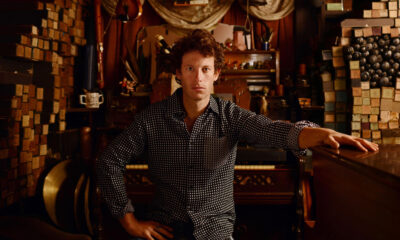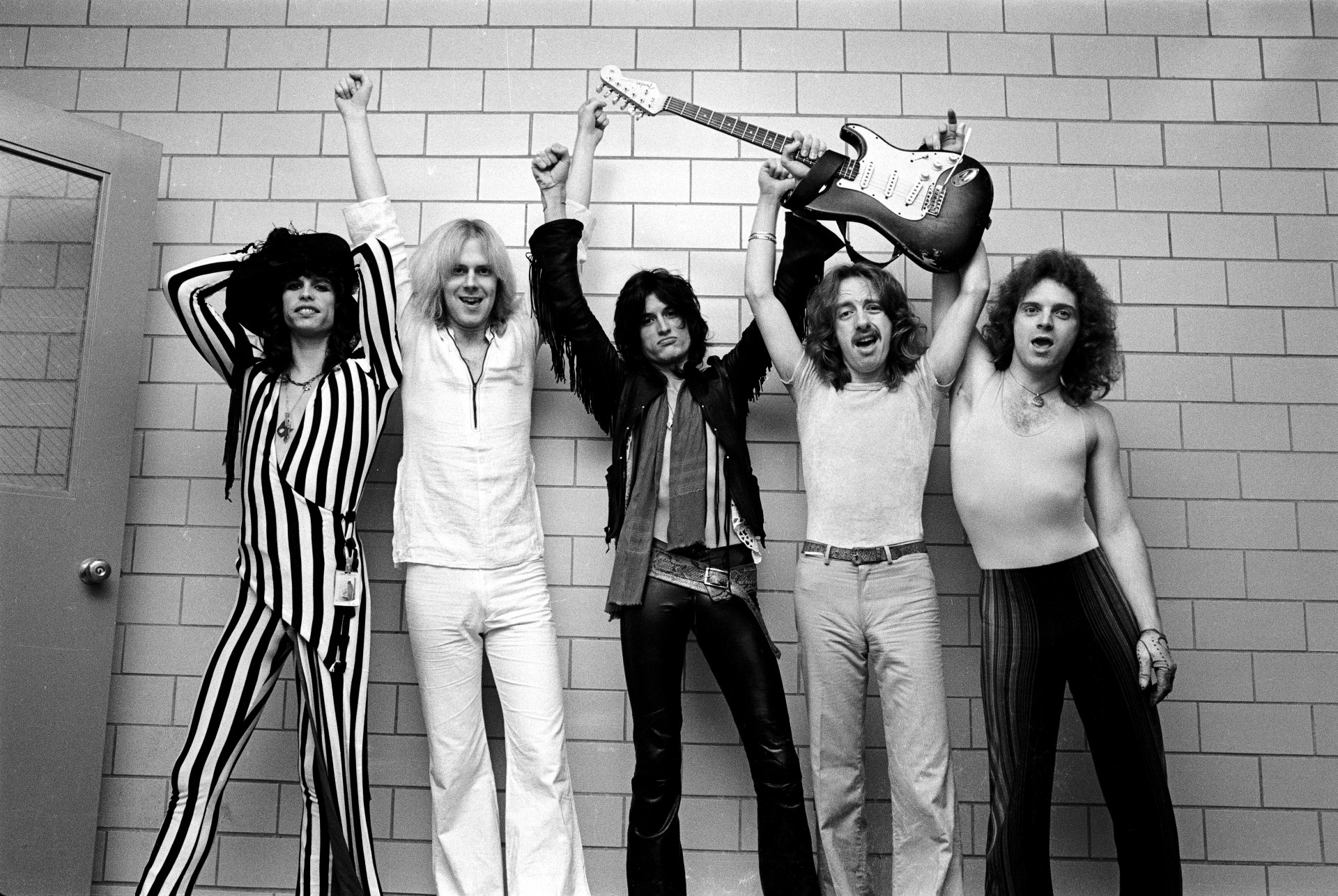Interviews
Interview with StandBy Records CEO and Owner Neil Sheehan
StandBy Records is an independent rock/metal label from Cleveland, Ohio that has propelled the careers of several notable artists including Emarosa, Before Their Eyes, and most recently metal heavyweights Black Veil Brides. Black Veil Brides have become a juggernaut on the Billboard charts and received numerous awards and accolades. At the company’s helm is StandBy Records CEO and Owner Neil Sheehan. As the music business continues to evolve, Sheehan’s company has remained relevant with their finger-on-the-pulse of industry trends and by nurturing and developing upcoming bands. I took some time to have a chit-chat with Sheehan about what’s going on with the music industry and his record label and artists.

Check out the song: “Maybe Holding Hands Wasn’t Such A Good Idea”
StandBy Records is an independent rock/metal label from Cleveland, Ohio that has propelled the careers of several notable artists including Emarosa, Before Their Eyes, and most recently metal heavyweights Black Veil Brides. Black Veil Brides have become a juggernaut on the Billboard charts and received numerous awards and accolades. At the company’s helm is StandBy Records CEO and Owner Neil Sheehan. As the music business continues to evolve, Sheehan’s company has remained relevant with their finger-on-the-pulse of industry trends and by nurturing and developing upcoming bands. I took some time to have a chit-chat with Sheehan about what’s going on with the music industry and his record label and artists.
How did you start in the music business?
Neil: I was a DJ in college and started booking some shows at a local club for hardcore bands and DJ’ed at parties. That was the first time I realized that not only was it exciting to do what I loved, but also get a few bucks (or beer back then) at the same time. In 2001, after the World Trade Center attack, I booked a benefit concert in Cleveland for Denis Leary’s Fire Fighter’s organization. That turned into me opening my own company as an independent concert promoter. I started running shows through Clear Channel venues and other local venues. By 2004, I had a few employees and was running close to 100 shows a year. I was also getting asked to manage a few bands; that got me started managing acts from all over the US and getting them deals with record labels. By 2007, we had 17 bands signed to record labels and my staff of 8 were running over 300 shows a year. I also bought a recording studio and hired a full time producer. In 2007, Standby was offered to me by an old management client and that started the label side of things.
How did StandBy Records come to fruition?
Neil: Nick Moore was a management client of mine while he was in the band Before Their Eyes. He had started Standby in Toledo, Ohio and had a handful of bands signed in 2007. He didn’t have any real distribution and BFE was getting busy on tour, he asked if I was interested in buying the label. In mid 2007, I decided to buy Standby and we went out, secured distribution, signed more bands and went full time.
How did you discover Black Veil Brides?
Neil: The band was originally from Cincinnati, Ohio. I had gotten the band Beneath The Sky signed to Victory Records from Cincinnati and my staff and I know the landscape of Ohio and the Midwest pretty well. We had heard of BVB at the time and, to be honest, I wasn’t impressed with the lineup at the time. About a year later, my 14 year old daughter came home one day and I asked if I knew the band BVB. I said, “Yes.” She freaked out and played a song for me on the internet. I dug the new song. I found out Andy picked up and moved to LA and became a MySpace/Internet celebrity of sorts. The song was great and I reached out to his Dad who managed the band. Andy and I spoke on several occasions via the phone and discussed his outlook on music, his vision for his band, etc. We put an offer into the band and Andy’s Father. The rest is history.
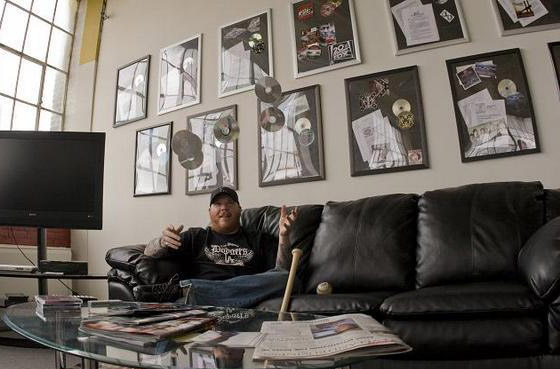
With the release of Black Veil Brides’ second album, Set The World On Fire, via Lava/Universal Republic Records, was this an upstream deal, production and development deal, etc.? How did Jason Flom become involved with the band?
Neil: After we signed BVB I approached Hot Topic to see if they would give us a slot for one t-shirt in their stores. They balked. Again, BVB was relatively unknown and the band hadn’t played a show in LA. Hell, they didn’t even have a full time band as Andy was getting all the right players together. I sent Hot Topic the song “Knives And Pens” and the numbers on the band’s Social Networking Sites. Andy had a huge following already online and it was growing exponentially every day. Finally Hot Topic relented and gave me one shirt, so I made a graphic of Andy’s face, knowing that that would draw attention to his fans already and have new people asking, “Who is that guy?” Within a week or so Hot Topic called and said it was the number one shirt in their store.
During this time the “Knives And Pens” video that was shot was on YouTube and blew up virally. We had the band poised to go into the studio and record We Stitch These Wounds and we started fielding emails and calls from a few majors. By the time we finished the album, we had sold close to 60K t-shirts through Hot Topic and the “Knives And Pens” video had gone over 10M views. We put out the record and it debuted at number 1 on the Independent Charts on Billboard. At that time we had more labels asking about the band and if they were available. I got a call from Jason Flom who seemed, genuinely, the most interested in the band. He was very appreciative of the work Standby had done and didn’t want to cut ties with the label.
I spoke to the band’s attorney and I knew Andy and crew were itching to make the next leap forward in their careers. We still have the band under contract and could have blocked any and all comers and just make them stay with Standby. However, I knew Andy’s passion and vision and I knew Standby’s limitations. I also developed a relationship with Andy’s father who, I knew, had a great love for his son and his firm belief in needing a bigger platform for BVB. I spoke to Jason and stated I was hesitant to just “sell out a band” and that was the wrong image for our label. Again to his credit he understood the image of a smaller label as he started with LAVA and we struck a deal that allowed the band to release albums on LAVA/Universal Republic while keeping Standby involved.
It was best for both parties; Andy needed something we didn’t have, a global reach and full dedicated staff that could get his message out much quicker and efficiently. We wanted and needed a partner, long term, with a larger label that understood we were a smaller indie with a bigger vision. Looking back on it now, we really had our pick of several labels and we could have just told Andy/BVB, “No, you are stuck with us,” and just capitalize on them monetarily. But we didn’t, we did the right thing and I think not only the band appreciated it, but all parties involved realized that Standby was not a label looking to just line its pockets, hold a band down, and destroy a band for the benefit of the label’s dollar.
Many unsigned artists reading this site want to know: Does Standby Records accept unsolicited material?
Neil: We do, just email info@standbyrecords.net and we can tell you how to submit.
What advice would you give to people wanting to start working the music industry?
Neil: Tony Brummel gave me great advice. He said, “Be willing to give people something new, sacrifice and work hard.” I think that sentiment goes a long way, especially when starting in the industry. I started with $900 in my bank account, in an attic in 2001. I sacrificed time with my family, a marriage, a credit score, etc. But 11 years later I wouldn’t trade it in for the world. If you truly have a passion for music you will work through anything. You can’t think about money. You can’t think about fame. You have to do it because you love doing it and you believe in either the band’s message or your message. A lot of kids now are asking whether they should go to school like a Full Sail for things like management, etc. To be honest, I’m not sure. I can tell you I hire people based on work ethic and hunger. I could care less if you had straight A’s in school or how much you think you know. If you are willing to work 24 hours a day and actually learn, then that is more important than book smarts.
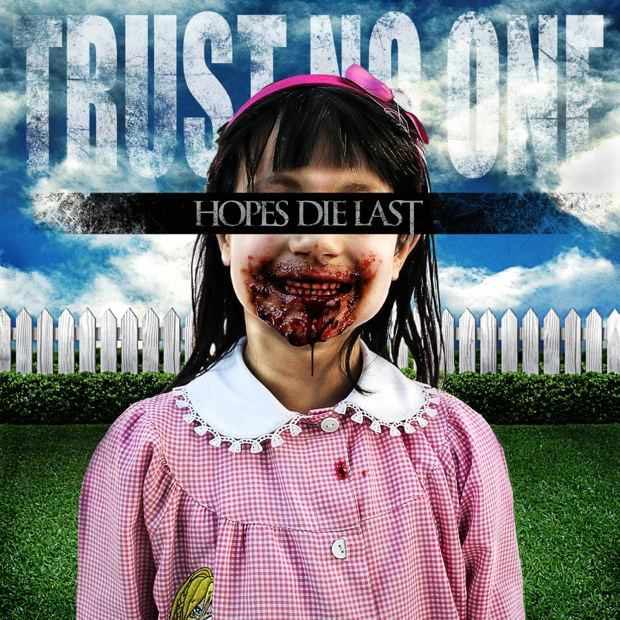
What advice would you give upcoming indie label owners?
Neil: The label side of things are in a quandary at this time. It is tough to start a label and dare I’d say, maybe hold out a year or so to see where the digital and physical worlds finally ending up meeting. I was lucky enough not to have started in relying on the physical world as a label. Those labels that did are having a hard time making the change to the digital world. I would say, find bands you love, start small and brand your label. If you have the resources to put a team around you make sure they are in it for the long haul and hungry. Most importantly, get a good attorney to insure your agreements are in order and you are protected.
What were the integral parts of StandBy Records success?
Neil: Well I definitely think Black Veil Brides launched us into the stratosphere. But we did have releases from Emarosa, Before Their Eyes, Dot Dot Curve and others that have had success. But overall, I think the brand of Standby is the ultimate success. We are building the Rock and Roll 2.0 revolution. We don’t want to be a niche label. We are looking at the big picture and I think that message is getting out and part our success. I also think the honesty in which we run the label and the closeness to our bands is a huge part of the success. Ask bands like Modern Day Escape, they have full access to me and I think that allows bands a breather. They know we aren’t going to dictate things to them or go by the letter of the contract. If they need something, we find it. That is a huge part of Standby.
Music sales have grown. Do you see this as an ongoing trend?
Neil: Being a label owner for only 4 years our sales have continually gone up. Again, I was lucky enough to come in during a time that I didn’t rely on physical sales. But to answer the question more straightforward: I’m sure sales will always grow. The world will continue to grow bigger by population and more music will be made so in the case of numbers, it will always grow. However, I’m not sure if those numbers will be more single oriented, stream, subscription based, etc. I still think things are being worked out and I don’t see a true “standard” of buying music for quite some time. Maybe someone will invent a new medium of distribution/playing music on a physical product. That could be a game changer. Maybe everything will just be in the cloud and there will be no ownership. At this point, I don’t think anyone knows and that is kind of interesting and fun. But all in all, music will never go away, people will always want music; some will pay, some won’t. I can only hope that our brand and our bands make people want to be part of the ownership type of the music world.
The three major labels (UMG, Sony, and WMG) are going to stop manufacturing CDs. Do you feel this will alleviate the record industry’s problems?
Neil: I heard, or read that, but then I saw them deny those rumors. I don’t ever see them stopping the manufacturing of CDs unless a new physical medium comes along and overtakes CDs. Also, CDs still do amount for over half of all sales, so they would be shooting themselves in the foot for not producing a physical CD. Some genres and demographics want CDs, some don’t. I just don’t see them cutting this out completely.
How do you feel about UMG acquiring EMI Music and Sony/ATV acquiring EMI Music Publishing? Is this a good thing for the music industry?
Neil: Competition is best in my opinion. That makes capitalism work. It also makes bands and labels work harder. If it ultimately boils down to one or two labels, I think that will hurt. One will have a majority market share, the other will always be second. It doesn’t breed hard work to beat the other guy out or find better bands, produce better music, etc. That is why I like seeing a lot more indies gaining momentum. The more of us, the more music will get out and the more we all will fight for fans and try to develop the best music/bands/brands.

Some labels choose to not ingest their releases on Spotify. How do you feel about this strategy?
Neil: Actually, I’m having this discussion now with several labels. I’m not sure. I haven’t been able to really calculate if it has hurt us or not. I do know that I use Spotify, yet I bitch about it at times. So there is the catch 22, it’s a great idea and if I don’t want to I never have to buy any music again if I’m okay just streaming it. However, as a business owner that relies on music sales vs. streams, it could ultimately hurt our bottom line. I think either one of the following needs to happen: The stream payout needs to be higher, so there is not much of a difference between sales/streams. Or the stream has “bumpers” in them like hip hop mix tapes, “This stream is brought to you by XXXXX.” If someone likes the stream, they will go out and buy the music. I do not believe it deters piracy, which they are claiming. Those that steal will steal. Giving them an option to stream is not going to deter them from stealing it. That has to come in some form of SOPA [Stop Online Piracy Act] that everyone can agree on where it doesn’t hurt everyone’s liberties, only those that actually steal.
With the proliferation of the digital distribution of media, who will be the main players in the future?
Neil: I think the majors are getting their heads in the game. They have the pockets and manpower to figure out they can be the major digital players if they really want to be. For example, they can manipulate the content, not the delivery. They could give the best rates, if they want, the biggest reach and biggest marketing platforms. You have already seen they made a great deal with Spotify. If they want to take that and run with it to Facebook and other mediums, they could monopolize the game again.
How has marketing an artist changed since the days of where CDs were king?
Neil: I only managed during the “CD was king” days, I can tell you that when I managed even baby bands, we wouldn’t think of shipping less than 10-20K units. The marketing was fairly limited; some terrestrial specialty radio, print ads, some online promo, public relations and touring. Now with piracy, you have to do all of the above plus ship less units, maybe 2-3K on a new artists. The biggest changes in marketing per say is how much the labels will be able to invest in artists. Marketing can always be standard, viral, grass roots, etc. Those things won’t change and people will find ways to market, again, it’s going to be the amount of money a label will risk now on their marketing efforts since profits are lower and piracy is higher.
Is terrestrial radio going to be dead in the future?
Neil: I don’t think so. Again, it’s a genre and demographic thing. My dad is 70 years old and listens to the radio. My daughter is 15 and listens to the radio. Everyone in between probably has a Sirius/XM or just watched YouTube for music. Clear Channel and all the big radio players aren’t going to let their baby completely just die. Those guys don’t quit. Do I think we will hear more homogenized/bland playlists, yes. They will continually get less diverse and only play those bands/songs that cater to their advertising dollars; but complete death, no.
Do indie label owners get no respect compared to major label executives?
Neil: I don’t think so. If that was the case then guys like John Janick at FueledByRamen, Bob Becker at Fearless, Tony Brummel at Victory, etc., wouldn’t be getting their bands cherry picked by majors. I think it’s quite the opposite in the corridors and back rooms of majors, they are totally respectful and using our indies as their A&R, then trying to pilfer our rosters. Do they come out and say those things and give us “respect” in the public eye; no, but I don’t think that is their job either. Most of these guys have a corporation and stock holders to answer to, not stroke our egos that we are doing a better job finding talent and developing it than they are.
Check out the song: “Unleash Hell”
It seems like major labels will always remain competitive because of their vast catalogue in addition to their in-roads for pop artists. As far as frontline releases, how are indie labels and specifically, rock/metal labels remaining competitive?
Neil: Artist development, period. A major has to have a success out the gate. We can put out 2-3 albums and live and hope that 3rd of 4th record sells 100K. If a major doesn’t sell a few hundred thousand it’s not a success in their eyes. Indies will be competitive because our maturation period for bands is much longer.
Indie labels seem to have better success in marketing rock/metal artists than major labels. Do you think indie labels are the future for releasing rock/metal acts?
Neil: I hope so! We at Standby are trying to be the next “go to” label for rock bands. That is why we created RNR2.0 and why the majors are looking at our bands. I don’t think majors will ever not be successful marketing those type of acts, especially active rock bands as it costs so much for radio, but I think they would rather see indies do the legwork, spend the initial dollars and then swoop in on something they can just put a cellophane wrapper around and buy it out from an indie.
Standby Records and other competing rock/metal indie labels’ business module seem to rely on the long-tail. How do you feel about this and is this a sustainable business module? What are the strengths, weaknesses, opportunities, and threats?
Neil: I don’t think we will know for awhile. Every indie I know of doesn’t just rely on sales. They rely on merch, publishing, etc. I think that in the long term indies will have to become not only labels but pseudo managers if they want to stay profitable and viable. The long-tail approach is one aspect of a band’s career (music sales) and if you rely on one thing I think you’re destined to fail. You must diversify and you must be open to new ideas and new models of business.
What is the future of the record industry?
Neil: I’m not a pessimist, it will always be here. In what form, who knows, but it won’t die as some predict. People thought that about sheet music, then the phono-graph, then radio, tape trading, video, etc. If anything, we should hope that this digital evolution will help the industry in the long term. For the last 10 years, the industry relied on CD sales and a CD sale only because the profit margins were so deep and there was a monopoly on the distribution. Now that era is over it will take some time to find out what works, what doesn’t and to take more of an initiative to find other revenue streams. It will also force labels to be more partners with an artist than just a label. It will be an interesting next 5-10 years. I just hope Standby is an integral part of that.
What are some upcoming Standby Records releases that you are really excited about?
Neil: Picture Me Broken. It is fronted by Gregg Allman’s daughter, Brooklyn. They are in the studio now with David Bendeth (Breaking Benjamin) and I expect great songs and radio hits. Davey Suicide has the look, the brand, the sound that could be the next Manson/Zombie. Modern Day Escape’s new album by Don Debiase is amazing. I think they could definitely be the next breakout rock band that can play to a Warped Tour crowd and a Papa Roach crowd. Star City Meltdown has hits. Bottomline, these guys write stuff that could be on the radio today. It’s Active Rock at its best.
Where do you see yourself and Standby Records in the next five to ten years?
Neil: Well, we can only hope to have our RNR2.0 brand in every store, home, and office across the world, bringing the best quality of rock to everyone who can hear!
-

 Alternative/Rock2 weeks ago
Alternative/Rock2 weeks agoThe Hives Bring Their Swedish Swagger to Leeds O2 Academy [Photos]
-

 Culture4 days ago
Culture4 days agoCirque Du Soleil OVO Takes Leeds Fans on a Unique, Unforgettable Journey [Photos]
-

 Hardcore/Punk4 days ago
Hardcore/Punk4 days agoHastings Beat Punks Kid Kapichi Vent Their Frustrations at Leeds Beckett University [Photos]
-

 Alternative/Rock3 days ago
Alternative/Rock3 days agoA Rejuvenated Dream State are ‘Still Dreaming’ as They Bounce Into Manchester YES [Photos]
-
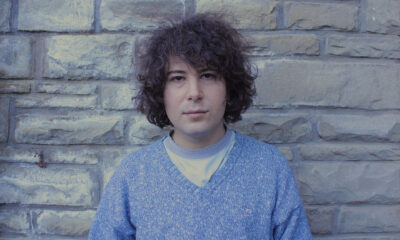
 Indie5 days ago
Indie5 days agoMichele Ducci Premieres Bouncy New Single “You Lay the Path by Walking on it”
-

 Alternative/Rock6 days ago
Alternative/Rock6 days agoWilliam Edward Thompson Premieres His Stripped-Down “Sleep Test” Music Video
-

 Country7 days ago
Country7 days agoJayce Turley Reflects on “Misery” with the Premiere of His New Single
-
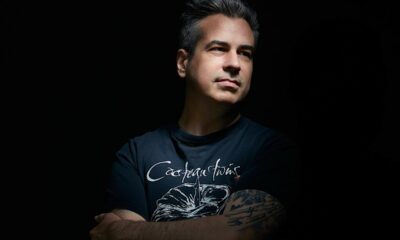
 Dance/Electronic2 weeks ago
Dance/Electronic2 weeks agoPerfect Female Type Premieres Synthwave Single “Science of Love”


